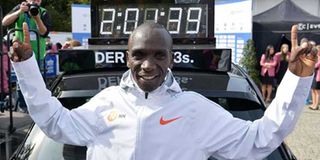Kipchoge takes marathon to a new era

Kenya's Eliud Kipchoge stands in front of a clock displaying his time after winning the Berlin Marathon setting a new world record with 2: 01: 39 on September 16, 2018 in Berlin. PHOTO | JOHN MACDOUGALL | AFP
What you need to know:
That happened as compatriot Gladys Cherono claimed a hat-trick of Berlin Marathon titles, also winning in a course record and personal best time under warm and pristine conditions.
Olympic champion Eliud Kipchoge made a majestic leap to another marathon era when he shattered the world marathon record in Berlin on Sunday.
That happened as compatriot Gladys Cherono claimed a hat-trick of Berlin Marathon titles, also winning in a course record and personal best time under warm and pristine conditions.
At no time did Kipchoge wade outside the times set by the previous world record holder Dennis Kimetto as he smashed the record by a massive one minutes and 16 seconds, clocking 2 hours, 01 minute and 39 seconds to retain his Berlin Marathon title.
The 33-year-old Kipchoge edged out compatriot Amos Kipruto to second place in 2:06:22 as the 2013 Berlin Marathon champion Wilson Kipsang settled for third in 2:06:47.
The world record stayed in Kenyans hands once again after Patrick Makau (2:03:38) in 2011, Wilson Kipsang (2:03:23) in 2013 and Dennis Kimetto (2:02:57) in 2014. All the world records came from the Berlin course.
Kipchoge simply affirmed his pedigree as the greatest marathoner ever, blowing the field from the onset to win his third Berlin Marathon after previous exploits in 2015 (2:04:42) and 2017 (2:04:17).
To explain Kipchoge’s unparalleled class, no athlete has broken the world record, beating their opponents by more than 30 seconds. The last time that happened was when Paul Tergat break Khalid Khannouchi's record in Berlin in 2003 with a time of to 2:04:26.
It was also the largest single improvement on the marathon world record since Derek Clayton improved the mark by 2:23 in 1967.
Kipchoge ran at the front from the very first metre, and despite some turbulent times in the first third of the race when his pacers faltered, stormed home to take another win and lower the world record by a remarkable 78 seconds
Kipchoge hit the half way mark with one pacesetter in 57:26 minutes, way inside Kimetto world record by one minute and nine seconds before hitting 1:26:45 against Kimetto’s 1:27:38 at 30km mark.
The 2003 World 5,000m champion build a 45 seconds inside Kimetto’s world record when passing the 35km mark in 1:41:03 before cruising past the 40km in 1:55:32 against Kimetto’s 1:56.32.
Kipchoge ran 5km in 14:24 - which was 1:26 faster than world record pace - and passed under the 10km barrier in 29:01.
At 10km, Kipchoge was 23 seconds deep into Kimetto’s world record pace. Kipchoge was only 14 seconds inside Kimetto world record.
With a lone pacesetter doing great job, Kipchoge hit 20km in 57:56 and the halfway mark at 61:06 - almost on par with the target of 61 minutes for the first half. The leading duo went through 25km in 1:12:24, and as Kipsang faded in the second group.
"It was hard," Kipchoge said. "I ran my own race, I trusted my trainers, my programme and my coach. That's what pushed me in the last kilometres.
“I had great belief that I could achieve this feat and running a sub 2 hours two minutes was simply amazing and I believe I can still go below that with such good conditions," said Kipchoge, adding that he could have posted better times if he went with the pacesetters up to 30km mark.
Cherono, who broke away from the pack at the 25km mark, swept the course to victory in 2 hours, 18 minutes and 11 seconds, becoming the fourth fastest woman in the history of women’s marathon.
She broke Japanese Mizuki Noguchi’s 13-year-old course record by 61 seconds besides improving her personal best of 2:19:25 set with victory in 2015 in Berlin. Noguchi won the 2005 Berlin in a course record time of 2:19:12.
Cherono, the 2014 World Half Marathon champion, edged out Ethiopia’s Ruti Aga, who was fresh from finishing second at Tokyo Marathon in February and multiple world and Olympic champion Tirunesh Tirunsh Dibaba also from Ethiopia to second and third places in 2:18:34 and 2:18:55 respectively.
“My target was to break he course record and improve on my personal best and I am happy I did it,” said Cherono, who retained her title for her third success in Berlin. She won in Berlin in 2015 in personal best 2:19:25 before reclaiming the title last year in 2:20:23.
Cherono’s time was the fourth fastest time in the history of women’s marathon after Paula Radcliffe’s 2:15:25, Mary Keitany’s 2:17:01 and Dibaba’s 2:17:56.
Cherono got to pocket a total of Sh 9.5 million; Sh 5.5million for winning and a bonus of Sh 4 million from running below 2 hours and 20 minutes. Aga and Dibaba also got Sh 4 million each in bonuses apart from their prize money.
It was the first marathon in history in which three women finished inside 2:18


